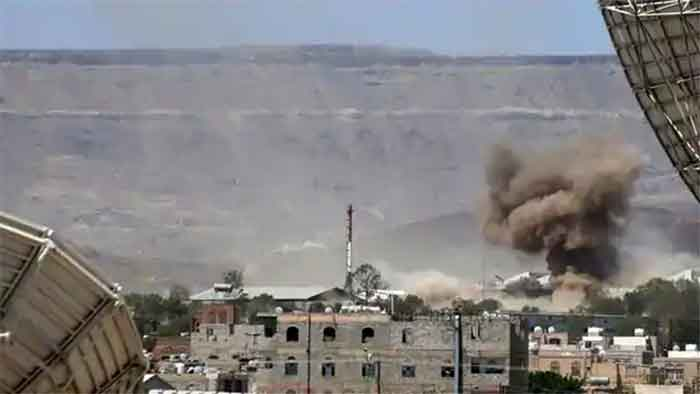The U.S. launched airstrikes in Syria on Thursday, targeting facilities near the Iraqi border used by Iranian-backed militia groups.
The Pentagon said the strikes were retaliation for a Feb. 15 rocket attack in northern Iraq that killed one civilian contractor and wounded a U.S. service member and other coalition troops.
The airstrike was the first military action undertaken by the Biden administration, which in its first weeks has emphasized its intent to put more focus on the challenges posed by China, even as Mideast threats persist.
The U.S. launched the strike one day after Biden spoke with Iraqi Prime Minister Mustafa Al-Kadhimi. The two leaders “discussed the recent rocket attacks against Iraqi and coalition personnel and agreed that those responsible for such attacks must be held fully to account,” the White House said Wednesday in a statement.
“I’m confident in the target that we went after, we know what we hit,” Defense Secretary Lloyd Austin told reporters flying with him from California to Washington. Speaking shortly after the airstrikes, he added, “We are confident that that target was being used by the same Shia militants that conducted the strikes,” referring to the Feb. 15 rocket attack.
Austin said he recommended the action to Biden.
“We said a number of times that we will respond on our timeline,” Austin said. “We wanted to be sure of the connectivity and we wanted to be sure that we had the right targets.”
“At President Biden’s direction US military forces earlier this evening conducted airstrikes against infrastructure utilized by Iranian backed militant groups in eastern Syria,” the Pentagon’s spokesperson John Kirby said in a statement. The attack took place around 6 pm Eastern time on Thursday.
Kirby echoed earlier media reports that the bombing of the Syrian territory was in retaliation to “recent attacks against American and coalition personnel in Iraq.” He further argued that the raids were aimed at defusing the tensions in the Middle East.
Kirby claimed that the strikes inflicted serious damage on the infrastructure of “a number of Iranian backed militant groups including Kait’ib Hezbollah and Kait’ib Sayyid al Shuhad,” noting that “multiple facilities” were destroyed.
Unconfirmed reports from Syria spoke of explosions near Al-Bukamal, a town in the Deir-ez-Zor province near the border with Iraq.
The reported airstrikes come after a series of rocket attacks on the Green Zone in Baghdad, the Balad Air Base and the Erbil International Airport in Iraq over the past two weeks. No group has claimed responsibility and the Pentagon has not officially blamed anyone.
This is not the first time the U.S. has blamed Iran for attacks on U.S. troops and contractors in neighboring Iraq. After one contractor died, the Trump administration targeted the Kataib Hezbollah militia and other Shia Popular Mobilization Units (PMU), which culminated in the drone assassination of General Qassem Soleimani, commander of the Quds Force of the Islamic Revolutionary Guard Corps (IRGC) of Iran, in January 2020.
Biden himself led the chorus of Democrats who denounced President Donald Trump’s move at the time, saying he “tossed a stick of dynamite into a tinderbox.” House Speaker Nancy Pelosi (D-California) had said the Soleimani strike risked “provoking further dangerous escalation of violence” and was undertaken without congressional authorization.
Mary Ellen O’Connell, a professor at Notre Dame Law School, criticized the U.S. attack as a violation of international law.
“The United Nations Charter makes absolutely clear that the use of military force on the territory of a foreign sovereign state is lawful only in response to an armed attack on the defending state for which the target state is responsible,” she said. “None of those elements is met in the Syria strike.”
A U.S. official, speaking on the condition of anonymity, said the decision to carry out these strikes was meant to send a signal that while the U.S. wanted to punish the militias, it did not want the situation to spiral into a bigger conflict.
The official added that Biden was presented with a range of options and one of the most limited responses was chosen.
It was not clear how, or whether, the strike might affect U.S. efforts to coax Iran back into a negotiation about both sides resuming compliance with the agreement.
At about 2 a.m. local time, a single F-15 jet fired at a cluster of buildings at a location believed to be a transit point for smuggling militia members into Iraq, according to a U.S. official. A handful of people were expected to be at the location, the official said.
After about a decade of civil war, Syria’s military is in little position to respond directly to a U.S. attack. The country faced two attacks by the U.S. military during former President Donald Trump’s tenure.
By hitting a facility in Syria said to be tied to Iranian-linked militia groups, the U.S. avoids raising tensions that would come with a strike directly on Iran, which the Biden administration is seeking to persuade to return to the 2015 nuclear deal that Trump withdrew from three years ago.
 Eurasia Press & News
Eurasia Press & News




